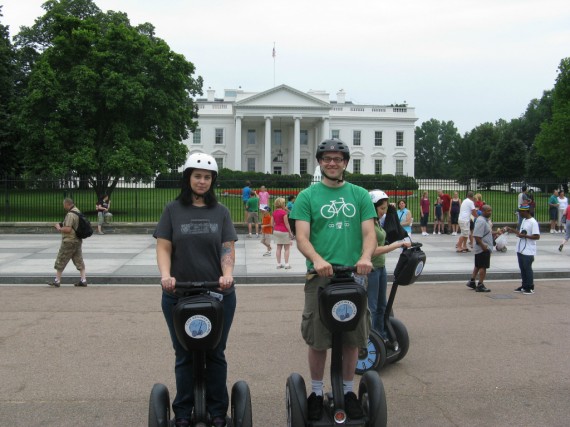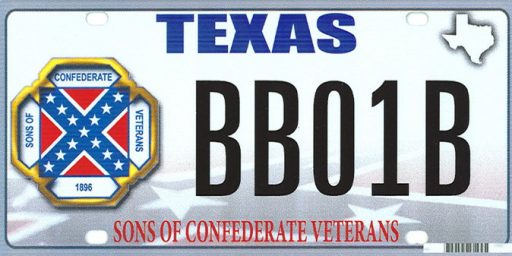Federal Court Strikes Down D.C. Law Requiring Tour Guides To Be Licensed
A Federal Appeals Court has struck down a D.C. law requiring tour guides to get a license and pass a test.
On Friday, a Federal Appeals Court in Washington, D.C. struck down a city ordinance that required people giving tour guides to be licensed by the city, a license they can only obtain after passing a test:
Getting paid to tell tourists about D.C. history will no longer involve passing a 100-question test or paying a fee. Anyone can just show up and talk without fear of arrest.
On Friday, the U.S. Court of Appeals for the D.C. Circuit threw out a 108-year-old city code requiring every “sightseeing tour guide” in the city to be licensed after correctly answering 70 out of 100 multiple-choice questions.
The decision is a victory for Tonia Edwards and Bill Main, the married couple who together operate the (illegal, until Friday) Segway tour company Segs in the City and have battled the regulations since 2010.
The $200 cost of the licensing process was too high for many of their guides, they said, often recent college graduates who work in the business for only a few months.
In her opinion, Judge Janice Rogers Brown, joined by the two other judges on the panel, ruled that the city’s licensing exam was an unconstitutionally broad solution to a problem that may not exist.
“What, pray tell, does passing the exam have to do with regulating unscrupulous tour businesses and unethical guides?” she wrote. “How does memorization of addresses and other, pettifogging data about the District’s points of interest protect tourists from being swindled or harassed by charlatans?”
Audio guides are not subject to any such regulation, she noted, nor are guides who stand at one spot rather than escorting customers from site to site. Under the current code, a sightseeing bus could regale tourists with the voice of “a drunk off the street,” so long as the drunk was prerecorded.
Her decision overturns a previous ruling in U.S. District Court. In a motion filed in that court, the D.C. Attorney General’s Office contended that the law was “a legitimate exercise of the District’s police power to protect visitors to and residents of our city.” The regulation did not violate the First Amendment because the content of tours was not at issue, they said. Judge Paul L. Friedman agreed, finding that “the licensing scheme is aimed at conduct and does not unconstitutionally burden speech.”
The appeals court suggested narrower regulations aimed at fraud in the industry or a voluntary accreditation scheme for guides who would like to be listed as city-approved.
On Friday, Main called the ruling a “victory for small business.”
“There’s no need for the city to license us to speak,” he said.
Matt Simpson, who has been a guide with Segs in the City for five years, said the market weeds out bad tours, with people taking to Web sites such as Yelp and TripAdvisor to describe their experiences.
Simpson said even people who pass the test can get things wrong. He noted a news story he came across when the suit was filed, quoting a licensed tour guide incorrectly calling the Eisenhower Executive Building the Old Executive Office Building.
“If you’re going to criticize us at least get it right,” Simpson said, pointing out that the building’s name was changed in 1999.
(…)
Robert McNamara of the Institute of Justice, a libertarian law firm that represented the guides in the District and also is involved in the New Orleans case, said he would love to see the conflict go to the U.S. Supreme Court to address what he describes as “an explosion in government overreach and litigation of what we call occupational speech, people who talk for living.”
Under the D.C. code, unlicensed tour guides were technically at risk of a $300 fine or 90 days in jail. But an administrator at the Department of Consumer and Regulatory Affairs told the District Court that no guides had been issued an infraction notice since 2005. “In fact, none of my staff can recall ever citing a tour guide or tour guide company,” he wrote.
This ridiculous testing requirement for tour guides is just one example of some of the egregious occupational licensing laws that the Institute of Justice and similar libertarian-oriented law firms have fought against for many years now. While most people are familiar with the licensing laws that cover things like the medical and legal professions, for which there is an at least colorible argument in favor of the idea that people who hold themselves out to the public as being in a certain profession should have to demonstrate some minimum level of competence in the field and, more importantly, be subject to discipline from a central authority that exists outside the court system, these laws have been extended far beyond those areas. Depending on what city you or state that you live in, you’ll find that you need to get a license form some central authority to go into business as everything from a barber to a mortician to someone who braids hair in the style often preferred by African-Americans. In many cases, you will have to pay substantial fees and pass a test in order to get that license, assuming you can even get that far. For the most part, the authority that grants these licenses is made up of representatives from the industry in question who clearly use their power to restrict competition and, most importantly, punish people who are competing against them. In that respect, they are acting in the same way as the cab companies protesting against companies like Uber and Lyft, but instead of causing traffic jams like the cabbies in Washington, D.C. did, they are using the cover of law.
With regard to the facts of this case, the Court is, of course, absolutely correct that the licensing requirements for tour guides were absurd, as George Scoville argued some three years ago when he looked at the regulations in question:
Tourism is the 2nd largest industry in the nation’s capital, behind government, and licensing regulations are designed to prevent commercial fraud. But despite the money that pours into the city annually as global visitors flock to the area on personal and business travel, the industry is curiously small:
Tourism ranks behind only government as a local industry in D.C. — 15 million visitors spend more than $5 billion a year in the region. The District licenses about 900 tour guides.
So there’s no doubt that, in terms of real dollars, tourism is a major industry-whether or not that should be a significant government interest is a completely separate discussion-but is the general welfare of society really at stake here? That certainly isn’t clear, particularly when word travels fast in this town, and that any tour guide business deliberately committing commercial fraud by lying about D.C.’s history to its consumers would quickly be sniffed out as phony and go out of business. It also isn’t clear to what extent tour guides account for D.C.’s annual tourism income.
Call me crazy, but I just don’t think many people would believe that Paul Bunyan dug the Tidal Basin so his pet the Loch Ness Monster could have a swimming hole near the Jefferson Memorial.
I also don’t think that, as long as the seat of the federal government is in Washington, people will stop coming to the D.C. area anytime soon and spending exorbitant amounts of money on tourism, restaurants, and hotels, just because maybe one or two bad apples give phony tours. It’s certainly not clear that this was ever the case with Edwards, Main, or Segs in the City, and three months in prison for lacking a professional license for something as innocuous as guided tours of a famous city seems like cruel and unusual punishment.
The other part of the argument against these rules, and the one that the D.C. Circuit discusses at great length in the opinion is that these regulations essentially constitute a prior restraint on speech, as McNamara pointed when this battle began:
The licensing process is expensive and time-consuming (rife with fees, forms and a written examination), but Bill and Tonia’s chief objection to the licensing program is one of principle: They believe that the government has no role in deciding who may (or may not) speak. Their customers can decide for themselves whether Bill and Tonia are worth listening to.
That is enough for Bill and Tonia’s customers, and that should be—must be—enough for D.C.’s city government as well. As the U.S. Supreme Court has repeatedly made clear, the First Amendment embraces a free marketplace of ideas. D.C.’s attempt to prevent guides like Bill and Tonia from bringing their ideas to market simply cannot stand.
Although IJ is arguing this case under the First Amendment to the Constitution, it is important to keep in mind that this law is just like the countless occupational-licensing requirements that IJ has challenged in the past: a barrier to entrepreneurship that does nothing at all to protect consumers. This case is simply an illustration of the expansiveness of mandatory occupational licensing. There is virtually nothing government thinks you should be able to do without its permission, not even describing things.
This case takes aim directly at that idea and advances the basic notion that everyone has the right to communicate for a living—whether they work as TV news reporters, tour guides or stand-up comedians—without first asking the government for permission. The First Amendment guarantees that right, and IJ will continue to protect it—in D.C., in Philadelphia and beyond.
As anyone who has ever taken their visiting relatives on a tour of the area where you live, there is no such thing as an expertise required to be a tour guide. Any person with a basic knowledge of the area that they’re in can perform the task. To the extent that there is alleged “public interest” in ensuring that tour guides can pass some ridiculous test, it is served by the fact that a competitive marketplace of tour guides will necessarily winnow out the bad ones. It would seem to me that this is especially true in the case of tour guides that cater primarily to tourists. In the modern age, such people are going to be looking online to find someone to perform a tour, or they are going to be asking the people at the hotel they happen to be staying at. In both cases, there are informal screening procedures that help to weed out the bad companies and reward the good ones. Furthermore, unlike lawyers who must pass a Bar Exam or physicians who must pass their licensing exam, the worst that happens to people who do business with a tour company that hires people who aren’t knowledgeable about the history of their area is that they walk away with incorrect or incomplete information. That’s far from ideal, of course, but it doesn’t rise to the level of damages a person who goes to someone holding themselves out as a lawyer or a doctor could suffer if things are not handled competently. Admittedly, licensed lawyers and doctors can still make mistakes or act improperly, but the odds of that happening are far lower with the screening process in place than without it. When it comes to tour guides no, the idea that such people need to be licensed by the state is quite simply absurd, and it’s difficult to see such regulations as anything other than an effort by the politically connected incumbents in the marketplace to protect themselves from upstarts. That is not a proper function of government.
Photo via Flickr user Mob Mob under a Creative Commons license
Here’s the opinion:







Maybe it’s just me, but I come away thinking that the problem here is not “too much licensing”, but rather “wrong kind of licensing”. Yes, it’s stupid for this rule to apply to mobile tour guides but not to stationary ones, or pre-recorded ones, or what have you. And the specific test in use sounds like it’s not the right test. But the city really does have a legitimate interest in quality assurance for tour guides, precisely because tourism is such an enormous portion of the local economy (and because Congress is a particularly sleazy landlord).
So require licensing for everyone, and make the test either be tailored to the business or be a reasonable test of general knowledge. And keep the fee — I have zero sympathy for
…because the employer should be paying that fee, not the individual tour guide.
Why should the government have the power to decide who can and cannot be a tour guide?
Why should the government have the power to decide who can and cannot be a lawyer?
@gVOR08: You probably meant that sarcastically, but I counter with this question: if I am a defendant, why should my choice of my defender be limited to those whom the government (or, in most cases, the Bar Association, a private group) deems acceptable?
I bet I know your answer — I need to be protected from making a “bad” choice and choosing someone not competent to defend me. Will you understand if I would rather not have your protection? Will you allow me to make my own choices, and live with the consequences thereof?
Perhaps I wish to be defended by someone who has let their Bar Association lapse — a retired attorney. Or someone who has a law degree, but has never practiced to the point where they felt the need to apply to the Bar. Or I just want to entrust my interests to whomever I goddamn choose, whether or not it meets with the Bar Association’s approval. Why shouldn’t I have the right to do so?
@gVOR08:
I address that in my post. There is real injury that can be caused by someone without legal training holding themselves out to the public as a lawyer. Not so with a tour guide.
Also, it is worth noting that regulation of the bar is typically structured as the Courts, typically the highest court of a particular state, setting the rules by which someone can appear in a representative capacity before them and the rules governing their behavior and conduct in those matters.
@gVOR08:
Well, for one thing, an unqualified lawyer has the potential to do tremendous damage to his client in a way that an unqualified tour guide doesn’t. If you hire a bad tour guide, you won’t generally end up in jail / lose your children / go bankrupt etc. as you might if you hire a bad a lawyer.
Breaking: SC rules laws don’t apply to closely held corporations who object to them.
@James Pearce: I’d be disappointed, but that would require some level of surprise.
@Rafer Janders: Well, for one thing, an unqualified lawyer has the potential to do tremendous damage to his client in a way that an unqualified tour guide doesn’t. If you hire a bad tour guide, you won’t generally end up in jail / lose your children / go bankrupt etc. as you might if you hire a bad a lawyer.
And that is a risk that people simply can’t be allowed to take. We must protect people from themselves, keep them from making choices that might not be in their own best interests.
Licensing should NOT be controlled by the federal court.
This decision is ABSURD.
Free speech has nothing to do with being a licensed professional.
Seems all that Feds are doing these days is Walmartization of all occupations…
Why bother go to school and be a professional ?.
Why bother maintain minimum standards that guarantee quality and safety ?
Nope. None of that. Instead they bring minimum wages for all with professionals
who invested in their businesses and skills – gutted out.
Shame on whoever supported this ABSURD decision.
Exactly right. When it comes to choosing skilled professionals for specialties where the client does not know or even can not know what is best, then there needs to be minimum qualifications whether that is governed by the state or a professional organiztion. The average client does need protection.
Well, thank God for this decision. If tour guides are required to know something about their subject before putting their expertise up for sale, freedom is destroyed.
Because everyone who’s ever listened to a Tea Partier knows, the root of all freedom is the freedom to be stupid.
@Scott: So, where do you draw the line? If I’m setting up a company, why can’t I call Bob, the paralegal who spent 15 years in a major law firm doing just that, but never took the bar?
And if I’m in real trouble, I’ll want Stodgy, Snooty & Stuffy, Esquires, not Joe’s Legal Advice and Taxidermy.
But for trivial stuff, why should I be limited to only those the Bar Association approves of?
BTW, I think that neither of the Clintons nor neither of the Obamas have kept up their licenses. So I guess that they aren’t qualified to act as lawyers, either?
@Jenos Idanian #13:
Re-upping your lapsed license is actually a fairly trivial act — you go online, check your status, send a check for your back dues, fill out a form, etc. If that’s stopping anyone from working for you, then they don’t want to work for you.
@Jenos Idanian #13:
Well, for one thing, Bob won’t have malpractice insurance, so if things go wrong and he makes a mistake you’re out of luck collecting any damages from him.
Bob also has no legally-mandated ethical and fiduciary obligations to act in your best interest (even potentially to his own detriment), so you have no guarantee that’s he’s doing so. If an attorney screws you, you actually have a fairly low bar to clear to prove that he’s liable; if a non-attorney whom you hired screws you, it’s caveat emptor.
Third, even is Bob has fifteen years of practical knowledge, not having gone to law school he’ll lack certain theoretical underpinnings — so while he often knows what do do in the vast majority of cases, he won’t often know why he’s doing out, or what to do in non-routine or unusual matters. The attorney’s skill is not to perform rote tasks, but to anticipate, plan for and think ahead of non-rote problems down the road.
@Jenos Idanian #13:
You won’t often know you’re in real trouble until it’s too late, because you’re not aware enough to know what’s important and what isn’t. Stodgy, Snooty will have the skills to prevent you from getting into real trouble in the first place, before you knew it was even a possibility.
@Jenos Idanian #13:
It’s not limited – you always have the ‘fool for a client’ option.
@Jenos Idanian #13:
Another factor: your attorney has certain ethical and court-mandated obligations to keep working on your matter, and if he withdraws from your employ or you fire him, he still has a duty to forward files, etc. to your next lawyers, to maintain files pertaining to your work in his office, to reasonably coordinate with your next attorney, etc.
Bob, on the other hand, can drop you like a hot potato in the middle of closing your deal, and there’s not much you can do about it. Call him up and ask for your files, and he can say “hey sorry, I tossed those” since he had no obligation to keep them.
@Rafer Janders: True enough for the Obamas, but Bill Clinton was disbarred for five years, and apparently hasn’t reapplied. I can’t find an answer for Hillary, but my hunch is she’s not a member of the NY bar.
Like so many things in life; nothing is absolute. We, collectively, have to use judgment. That is part of being in a functioning society. You discuss, argue, compromise, etc. to come to a rough approximation on where to draw the line. Is it perfect? No, but perfection shouldn’t be the enemy of the good.
None of rules and regulations come out of nowhere. At some point, the need arose and society collectively decided to do something about the need. Are corrections sometimes needed later? Sure, the subject of this blog post is an example of a correction.
@Rafer Janders: What you’re doing is rationalizing your position. You’re saying that, for my own protection, I need to be prevented from making bad choices — or, rather, what you think might be bad choices. Whether or not they are is irrelevant; do people have the right to make choices that you don’t approve of?
@Jenos Idanian #13: do people have the right to make choices that you don’t approve of?
Sorry, poorly phrased. Let me try it again: just where do you deign to allow people to make their own choices? What decisions are trivial enough that you will let people make their own decisions?
@Jenos Idanian #13:
You also don’t necessarily have to be a member of the state bar you work in, so long as you’re not appearing in court and/or offering certain state-specific legal advice. I have many friends and former colleagues, for example, who are NY Bar members but work in-house at Greenwich, CT hedge funds without being CT barred — and this is not a problem, since they’re not working on CT matters, but are usually dealing with NY or Delaware state law and/or jurisdictional matters.
@Doug Mataconis:
Because the municipality has a financial interest in the quality of tour guides, which translates directly into a welfare interest on the part of the locals.
Or, to put it more broadly, “because the residents of DC are better off that way”. That seems to me a reasonable test — do the net benefits of the law outweigh the harm done? If you want to argue that they do not, I’m open to being convinced. If you want to argue that this is the wrong test, I’d be curious to hear that too.
@Jenos Idanian #13:
Well, in a specific case for your own protection, but in a broader sense for the protection of commerce — the legislature has determined that overall, it will enhance the ease of doing business for certain professionals to be licensed in order to reduce the friction of having an individual consumer have to research anew each person she hires. Licensing — when done right — should enhance efficiency and thus make it easier for consumers and businesses to hire professionals to aid them and help get deals done. It’s a pro-business rationale.
@DrDaveT: Actually, who benefits the most are the larger guide companies — this is simple rent-seeking.
And the harm done? How about poor people who are being locked out of a potential business opportunity? How about the guides these people in the article hire?
I don’t recall any particular legal obligation to promote or even care about “the financial interest” of my community. By that standard, posting online about speed traps or talking derogatorily about my community could also be banned, as I’m acting against the “financial interest” of the community.
How about if I’m wealthy and I’m fed up with the local government? Can I shut down my business and move out of town?
How about I take my successful business and shut it down and level the building?
@Jenos Idanian #13:
Well, no one’s forcing you to hire an attorney, or to hire anyone else, for that matter. If you want to incorporate a company without a lawyer’s guidance, or represent yourself in court, or do your own taxes without an accountant, or manage your own finances without an investment adviser, or day-trade without a broker, or pull your own teeth without a dentist, or decorate your home without an interior designer, or walk around DC without a tour guide, etc. etc., you are fully free to do so. There’s no law stopping you.
You can make your own choices! You can make your own decisions! Live free, little bird, and fly, fly, fly to the sun!
@Rafer Janders: Here’s an alternative: make licensing optional, and crack down hard on anyone who claims to be licensed when they’re not. Make it very easy for consumers to make an informed choice.
And you’re still talking abstract, not concrete. How about requiring hair-weavers to get full cosmetologists’ licenses and go through expensive training that they will never use? Tour guides? Massage therapists?
How would you license psychics and past-life counselors and aura cleansers, among other quacks, for that matter?
@Jenos Idanian #13:
See, folks, what this poster is doing (either in an effort to confuse, because he is confused, or most likely both) is conflating two separate issues: the individual’s freedom to make choices, and a person’s freedom to hold himself out to the public as an expert when he may in fact lack any proper training.
Let’s put it this way: the law doesn’t prevent you from pulling your own teeth. The law doesn’t prevent you from asking your buddy Bob to pull your teeth. The law doesn’t prevent your buddy Bob from offering to pull your teeth. The only thing the law prevents is having Bob set up an office and hang out a sign saying “Bob: Expert Teeth Puller” without having gone to dental school and passing certain state-mandated tests to ensure that he actually knows what he’s doing, because we as a society have decided that we don’t want unqualified charlatans preying on everyone.
So all this “when do you allow people to make their own choices” is wildly off the mark, because licensing is meant to restrict fraud and misrepresentation, not choice.
@Jenos Idanian #13:
Why? That’s much more complicated and harder to enforce. Far easier to have a blanket rule of general applicability.
@Jenos Idanian #13:
I wouldn’t, as I see no distinction between that and other religious practices. We don’t license priests, preachers, imams, and rabbis, either.
@Rafer Janders: Why? That’s much more complicated and harder to enforce. Far easier to have a blanket rule of general applicability.
No, it’s not. Here’s a simple enforcement mechanism: set up a hefty fine for claiming to be licensed when you’re not, then say that part of the fine will be awarded to whomever first reports it. Then let everyone enforce the law.
Acceptable evidence: web site screenshot, picture of an office door, listing in the Yellow Pages, business card, flyers, anything that documents a claim to be licensed.
Next objection? I’m sure you have plenty of reasons why you’re so much smarter than other people, and they desperately need you to protect them from themselves.
@Jenos Idanian #13:
So, basically, unleash a flood of frivolous lawsuits and clog the courts….?
@Jenos Idanian #13:
Brilliant. There’s no faking those, after all!
@Jenos Idanian #13:
Once again, you can in fact call Bob The Paralegal and have him set up the company for you. No prohibition against that at all.
What Bob can’t do, however, is represent himself as an experienced attorney and not a paralegal when he isn’t.
And what you can’t do, when Bob screws up your incorporation when he didn’t foresee an issue, is expect to recover from his malpractice insurance, because he won’t have any, or complain about him to the state licensing board, because he’s not a member of one, or rely on his mandated ethical and fiduciary obligation to you to fix things, because he won’t have any.
But if you want to roll the dice, no one is stopping you. The totalitarian restriction on your freedom exists only in your own mind.
You know, you can gussy up the tour guide licensing requirements all you like. But it’s still the creation of a cartel, it’s still rent-seeking by existing interests and it’s still a way for the local government to bilk more money out of its citizens and its tourists. Something like one in three profession in this country requires some form of licensing. Licenses can be required for interior design and for hair braiding. The primary effect of these is to cut off options for poor people who might be able to scrape together enough money to start their own business but can’t for the huge fees and sometimes *years* of training required for licensing for the most mundane professions.
http://www.vox.com/cards/occupational-licensing/what-is-occupational-licensure-and-how-does-it-affect-workers-and
If you want to have “officially licensed” tour guides, fine. But there’s no reason to force people to only use those with the official $200 stamp of approval.
I once went on a tour of DC with a school, on a bus with a tour guide. We passed right by Ford’s Theater and there was not a mention, let alone a stop. I had to explain to the guide what Ford’s was, he had never heard of it.
I always find something new to see everytime I go. Best way is to just hit the sidewalks and start walking.
I am sure some of you remember Glenn Echo and Marshall Hall. Gone, but not forgotten.
@Rafer Janders: Are you too stupid to see the simple solutions, or too biased to let yourselves see them?
1) Part of licensing is requiring that their offices and all marketing materials declare their licensed status. (“Harrison Q. Stodgy, Esquire, CAL (Certified Attorney At Law)”)
2) $1,000 fine for falsely claiming to be licensed. Higher for repeated violations.
3) Maximum bounty of $100 for reporting someone falsely claiming to be licensed.
Oh, and forget that example. Suppose I’m on trial for horse thievery. For years I’ve been ably represented in criminal matters by Willie, who’s kept me out of all kinds of trouble. But Willie kinda sorta gave up his law license because he got caught lying under oath about getting serviced by an intern. He’s still just as competent at arguing the law, and I’d really like to have him defend me once again, even though he’s lost his license. Why can’t I knowingly have this unlicensed attorney defend me?
@Jenos Idanian #13:
Intellectual insecurity is an ugly thing. I’m sure you’re plenty smart in your own way, even if you can’t get any state licensing body or university to certify it.
The nice thing about less regulation here is that it probably won’t result in anarchy in the streets and complete bedlam. Society will still be orderly tomorrow as a result of one less intrusive regulation.
For anyone wanting a giggle, go read up on what happened when Vidal Sassoon first came to the US and refused to take the NYS cosmetology licensing exam. It’s hilarious. (Google “Sassoon” and “Lomenzo”–I only found links to Google Books and old newspaper sites and am not sure the links are permanent.)
On the other hand, considering that a lot of hair stuff involves some pretty nasty chemicals, it would be nice to make sure that the practitioners know at least enough so they don’t end up mixing the wrong solutions together and gassing their clients….